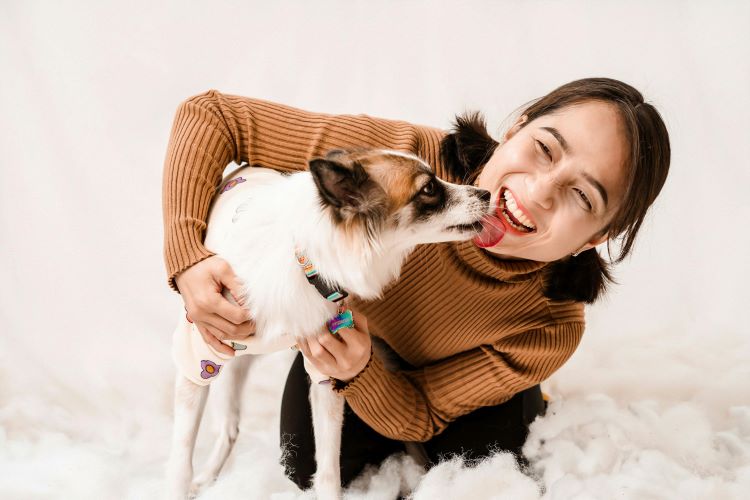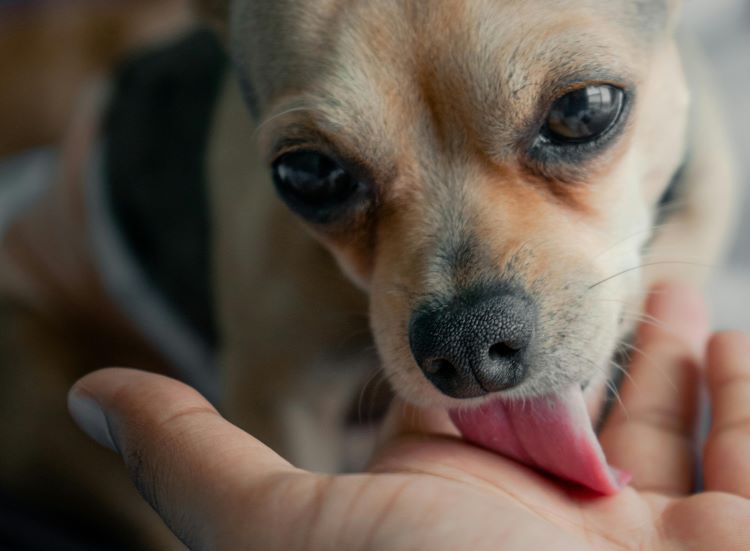Ready to help treat your pet to a healthy life?
Why do Dogs Lick People?
By : Kathleen Crampton | Published Jul 22, 2025

Talk to any dog parent, and they may have a different reason for why their pup licks people. They might categorize it as a friendly greeting, an affectionate kiss, or even a “just because you taste good!” With so many potential reasons, what’s the real answer to why do dogs lick people?
The reality is that licking is an often misunderstood dog behavior that even many canine researchers don’t fully understand. But that doesn’t mean there aren’t some well-founded theories. We went on a mission to uncover the meaning of dog licking and when, if ever, to be concerned about it.
Is licking just dog kissing?
Many people think that licking is just a dog’s version of kissing, and while that’s a sweet perspective, it’s not the whole story. When a dog licks a person, it may very well be to communicate their affection — in this case, acting as what we humans see as a kiss. And, of course, many pet owners may feel that their pup is expressing their own form of love toward their human family.
Nevertheless, we can’t actually read dogs’ minds, and researchers have been trying to debunk dog kisses (licking) for years. Whether your own dog licks you regularly or just on occasion, there could be several different reasons (or even a combination of reasons) for the behavior.
5 reasons dogs may lick humans
The professional canine community hasn’t come to any single consensus regarding why dogs lick humans. Instead, veterinarians and researchers have theorized several reasons why our furry companions exhibit this behavior.
1. Affection and bonding
It’s no secret that the dog-human bond can run deep. After all, the term “man’s best friend” didn’t just come out of nowhere. But why exactly do canines and their pet parents develop such bonds?
It may start with a lick. Just as humans show affection to pets by stroking their fur or giving them a belly rub, dogs show their love through licking, nuzzling, or giving a paw (among many other heartwarming behaviors).
While there isn’t a ton of conclusive research regarding the effects of dog-human interactions, some studies do show that when dogs lick people, oxytocin is released in their brain. You may have heard oxytocin referred to as the “cuddle chemical,” and for good reason. In mammals, this hormone is one of the mechanisms for relational bonding. For dogs, oxytocin can create that warm and fuzzy feeling toward their favorite human.
But it can go both ways. Another study found that both dogs and humans get that feel-good oxytocin release when they experience positive social interactions with one another.
2. Stress relief
Similar to why some dogs eat grass, they may lick people to help relieve any anxiety or stress that they may be carrying. The oxytocin release that many dogs experience through licking their pet parent may also lead to stress relief. Positive sensory stimulation, licking included, between an owner and their dog can lead to decreased cortisol and blood pressure, helping to calm an anxious pup down.
3. Attention
Dogs are social creatures, craving interaction with and attention from people around them. Attention-seeking behaviors can differ from pup to pup, but one that you may observe in your pet is licking.
Puppies are born knowing that licking may get them what they want (their mother’s milk, a snuggle from their sibling, and so on). It’s one of the first ways that they interact with the world. So, it makes sense that this behavior stays with them through adulthood. If your dog wants or needs something, like a play session, potty break, or food, they may lick you to get your attention.
4. Empathy
Another potential answer for “Why does my dog lick me?” may be to show that they care. For example, one study shows that if a dog sees a person crying (whether their owner or an unfamiliar individual), they often approach that person and sniff, lick, or nuzzle them. Although the researchers of this study note that this result may be due to the fact that these behaviors are often positively reinforced by pet parents, it does show that dogs can have empathic responses to human emotions. And licking may be one way of showing this type of understanding.
5. Exploration
Dogs use their mouths to explore. While this often starts as puppy biting during the younger years, it can be channeled into less painful behaviors as adults. Navigating the world around them might look like inspecting an unknown object with their mouth while on a walk, chewing a new toy, and licking surfaces or people.
If your dog licks you, it could just be that you smell interesting and they want to investigate! Licking can be one way of resolving their curiosity.
When dog licking may be a concern
While dog licking is an innate, normal behavior, there are times when it might be problematic. For example, if your pup’s licking and other attention-seeking behaviors are becoming distracting and disruptive, it could indicate the need for some extra training.
A more concerning situation is if your dog is excessively licking surfaces, not just you. This could indicate anxiety, obsessive compulsive disorder, or even gastrointestinal issues. If you notice incessant licking of objects, surfaces, and yourself, take your pup to the veterinarian to see if medical intervention is necessary.
This is when pet insurance can really come in handy. Just think about all the mischief that your dog may get into, potentially leading to unexpected injuries and medical conditions. With a dog insurance policy, you can rest assured that your pup can get the care they need for new and unexpected conditions.

How do I get my dog to stop licking me?
Whether or not dog licking is an accepted behavior is largely up to pet parents. Some people find it endearing, but others might not appreciate all that extra slobber. If you’re not so keen on dog licks, you may be wondering how to get a dog to stop licking you. Here are some tried-and-true approaches:
- Stay neutral. You may think that saying “no” or gently pushing their snout away will communicate to your dog that you don’t like the lick, but even a negative response may give them the attention they’re looking for. Instead, do not respond at all or, at the most, turn your body away.
- Keep them mentally and physically active. As an attention-seeking behavior, licking may be your dog’s way of saying, “I’m bored!” Make sure that you’re providing the recommended amount of mental stimulation and physical exercise to ensure that your pup has ways to expend their energy.
Remember that dogs lick people because it’s natural, serving as a way for your pup to explore, communicate, bond, and even relieve stress. While some dogs may lick more than others, keep in mind that if you have a licker on your hands, the goal shouldn’t be to get rid of the behavior — rather to show your furry pal that it isn’t your preferred interaction. They may lick you every now and then, but with consistent training, the frequency should decrease. And again, if you do notice excessive licking or any other potential issues along the way, don’t hesitate to reach out to your veterinarian.
Learn how pet insurance can help you tackle unexpected veterinary costs, whether you're trying to find out why your dog is licking so much or your pup gets unexpectedly injured.
